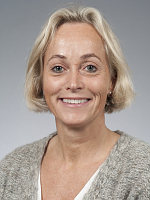Since 2016, Professor Anne Margarita Dyrhol-Riise and researchers from the research group she leads at the Department of Infection at UiO and OUS have collaborated with researchers from Stellenbosch University in South Africa.
In the project, they have compared data and samples from patients with tuberculosis in Norway and South Africa.
Former dean at the Faculty of Medicine, Frode Vartdal, believes that the collaboration on tuberculosis research has been successful.
“Dyrhol-Riise has published ten scientific articles together with her colleagues at Stellenbosch University. In my opinion, this is excellent,” he says.
International collaboration opens the world on many levels
Dyrhol-Riise believes international collaboration on research is important.

“International research collaboration is extremely important, both for us researchers and for people and societies around the world. It contributes to opening up the world on many levels,” the professor says. She continues:
“Traveling abroad and collaborating with international environments is enriching for a researcher. It is particularly important for students and young researchers who can learn new methodologies, establish networks, and generally gain a better understanding of research on common global issues.”
We must contribute to global research on diseases
Tuberculosis is an infectious disease caused by the tubercle bacterium. The infection can occur in various organs in the body, such as the lungs, brain, lymph glands and skeleton.
Each year, approximately 1.5 million people die from the disease, according to the World Health Organization. South Africa is one of the most affected countries.
Norwegian hospitals also treat patients with tuberculosis.
“We have relatively few cases of tuberculosis in Norway, and you may wonder why we should study this. But we have approximately 200-300 cases in Norway annually, mainly refugees and immigrants. We therefore must have knowledge on it,” Dyrhol-Riise says.
“At the same time, I think that with our resources we must also be able to contribute financially and scientifically to global research on diseases that are more common elsewhere in the world and where resources are scarcer,” she emphasises.
Compared data material from Norway and South Africa
One of the South African researchers, Bih Hycenta Chendi, received a grant from UiO which financed her doctoral work. Dyrhol-Riise believes that the grant has been crucial for the project.
“Collaboration often happens at the moment when you get available resources and hands to do the work,” she says.
Chendi was in the research group at UiO and OUS for a period in 2019 and defended her dissertation at UiO in the autumn of 2022.
“Among other things, she compared diagnostic methods in Norway and South Africa and investigated whether there were differences in the patients based on where they came from,” Dyrhol-Riise, who was one of her supervisors, says.
The project is the result of an institutional effort
The collaboration project with Stellenbosch University in South Africa is, among other things, the result of an investment at UiO in collaboration on research and student exchange with universities in the BRICS countries, i.e., Brazil, Russia, India, China and South Africa, according to Dag Kvale Head of Department at the Institute of Clinical Medicine at UiO.
In addition to Dyrhol-Riise, Kvale was one of the researchers from the institute who visited South Africa in 2016. Several research environments from the Faculty of Medicine, interested in collaborating with South African research institutions, went.
Two years earlier, former dean Frode Vartdal and colleagues made a first institutional visit.
“The fact that some structures had been created at the institutional level made it easier to collaborate. It was easier to start collaborating with the research group in Stellenbosch since the faculty had been there and said, "we are going to do this". Otherwise, it will often be the case that you collaborate with people you already know,” Dyrhol-Riise points out.
Easy to identify research areas to collaborate on
Dyrhol-Riise thinks that it is very important that the collaboration has significance for the place you collaborate with and the patients you research.
“My experience is that when you meet other researchers, they are concerned with many of the same issues regardless of where you are in the world,” the professor says.
She explains that her partners at Stellenbosch University have a strong and good research environment on tuberculosis, which she knew about through publications.
“Nevertheless, they struggle with financing like many of us do,” Dyrhol-Riise says.
Believes international collaboration should be stimulated after the pandemic
Dyrhol-Riise believes that international collaboration on research should be stimulated after restrictive measures during the pandemic severely limited the opportunities for travel and collaboration.
“Everything stopped a bit during the pandemic. South Africa was shut down for a long period. We managed to maintain contact with our partners in Stellenbosch through digital meetings since we already met physically and made plans before the pandemic,” she says and adds:
“Nevertheless, Chendi had fewer visits to Norway than planned.”
To achieve viable collaboration, it is important to meet physically, according to the professor.
“It is incredibly important to facilitate and promote international research collaboration in general and especially in a post-covid context. It is also very important that international students can come to Norway,” she underlines.
The research group at Stellenbosch University that Professor Anne Margarita Dyrhol-Riise and colleagues collaborate with is called the Immunology Research Group. Dyrhol-Riise has previously collaborated with South African researchers at Sefako Makgatho Health Sciences University, formerly MEDUNSA, in Pretoria.
In addition to Bih Hycenta Chendi's doctorate, the collaboration also enabled parts of Marte Jørgensen's doctoral work. She received funding from Helse Sør-Øst and had a two-month stay with the research group at Stellenbosch University. She defended her PhD at UiO in 2021 and had Dyrhol-Riise as one of her supervisors.
Contact
Read more
- Information about UiOs research collaboration with partner universities in South Africa (uio.no)
- Rektoratbloggen: Rector Svein Stølen and Vice-Rector for Education Bjørn Stensaker blog about the need for more international collaboration (uio.no) (in Norwegian)
- A new vaccine may provide better treatment for tuberculosis - Institute of Clinical Medicine (uio.no)
